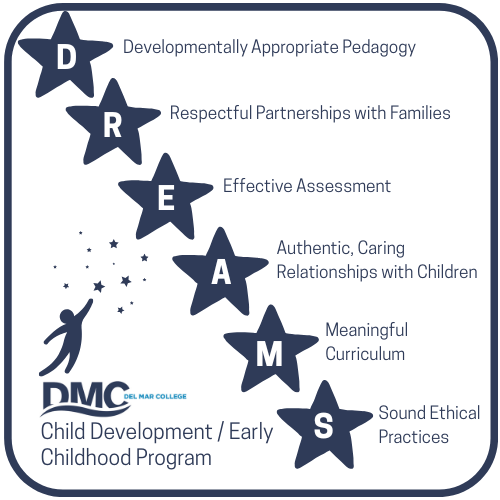Conceptual Framework
Conceptual Framework
The VISION of the Child Development /Early Childhood (CDEC) program at Del Mar College is to prepare early childhood professionals who promote the development of all children into capable, caring, and productive citizens of their community within the cultural context of the family.
The MISSION of the Child Development/Early Childhood (CDEC) program is to prepare students to become early childhood professionals who work with young children, families, and professionals in a variety of early childhood settings. The CDEC program will provide the knowledge base and skills that reflect the highest standards of quality in the field; and form a foundation of lifelong learning.
The CDEC program has been making dreams come true for hundreds of students. The CDEC A.A.S. degree program is not only closely aligned with NAEYC ‘s core standards, but based on a conceptual framework that reflects the program’s vision and mission. Students in the CDEC Program attain specific competencies to become successful professionals working with young children. The knowledge, skills, and dispositional outcomes create the conceptual framework upon which the program is based. Faculty members use the acronym D.R.E.A.M.S. to share this framework with students, stakeholders, and other community partners. Building on Del Mar College’s brand Dreams. Delivered., CDEC faculty aligned the NAEYC standards to the acronym D.R.E.A.M.S. , with each letter representing a guiding principle. Faculty and students grow as professionals in the field of early childhood education at Del Mar College by embracing and implementing these principles.
The conceptual framework supports the CDEC program’s commitment to high quality outcomes to our entire population in a variety of ways. Many efforts have been made to recruit for and promote a program that is accessible to all students who are genuinely interested in this career path. The six principles governing the CDEC program are:
D – Developmentally Appropriate Pedagogy
Best practices in CDEC coursework, field experiences, and practical experiences are explored in a variety of ways. Meeting the child’s developmental needs is fundamental to the child’s later successes. In order to help CDEC students meet the needs of young children, comprehensive knowledge of child development is critical. An emphasis on using this knowledge of children’s characteristics and needs is the basis for selecting appropriate content materials and the foundation needed to structure an environment for optimal learning.
R - Respectful Partnerships with Families
Children are served within the context of the family and their community. Thus, CDEC students need the skills to recognize the diverse roles and multiple influences that affect children’s development. Through their coursework, students demonstrate respect for families’ characteristics through curriculum, effective communication and inclusion of families in meaningful ways.
E - Effective Assessment
A goal of the CDEC program is to educate future early childhood professionals regarding the value and uses of the assessment of young children. It is important for students within the CDEC program to use observational methods in daily interactions with children and to have opportunities to recognize how to naturally embed assessment in curriculum. Assessment should not be thought of as an isolated professional task, but rather an on-going tool which includes multiple sources of information across a variety of domains as well as valuing the information families can contribute. CDEC students are taught to view assessment as a valuable tool to inform and support learning.
A – Authentic, Caring Relationships with Children
For optimal learning to occur, children must feel valued and capable. Such feelings come from early childhood professionals who emulate warmth and responsiveness in their interactions with young children. CDEC students are guided on how to treat children as individuals within a larger group by being sensitive to their needs and respectful of their interests. In addition, faculty model how to assist children’s behaviors to foster self-control, while building children’s self-esteem.
M - Meaningful Curriculum
Meaningful curriculum is first built upon knowledge of content and is tailored to support the skills of different ages, individual interests, and unique abilities of each child. Students are given opportunities to identify and build curriculum which makes connections to multiple developmental domains. The curriculum is then implemented with children in natural ways, which support hands-on play, exploration, and curiosity. Faculty demonstrate appropriate practices during class activities that provide opportunities for students to practice appropriate modeling and scaffolding.
S - Sound Ethical Practices
The professional commitment of upholding sound, ethical principles, is a hallmark of being a true advocate for young children, families, and the profession. Students in the CDEC program become aware of, and adhere to, NAEYC’s Code of Ethical Conduct and Statement of Commitment. CDEC students are given opportunities to demonstrate reflective abilities to improve their own practices. A goal in the CDEC Program is to foster students’ life-long commitment to the profession by promoting children’s learning and upholding the responsibility of being cognizant of developmentally appropriate practices.
Grounded in best practices, the CDEC program has always kept developmentally appropriate practices and NAEYC-inspired teaching strategies embedded in the curriculum. CDEC students experience real, meaningful experiences that are based on the NAEYC standards, position statements, and the Code of Ethical Conduct.

Page last updated April 30, 2025.


